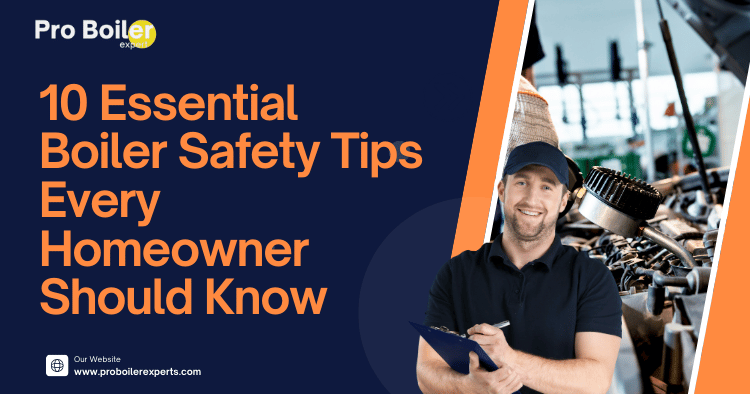Table of Contents
- Understanding Your Boiler
- Regular Maintenance is Key
- Know the Warning Signs
- Install Carbon Monoxide Detectors
- Keep the Area Around Your Boiler Clear
- Check Pressure Relief Valves
- Understand the Importance of Ventilation
- Emergency Shut-Off Procedures
- Educate All Household Members
- Hire a Qualified Professional
Understanding Your Boiler
Before we dive into safety tips, it’s essential to understand what a boiler is and how it functions. A boiler is a closed vessel that heats water or produces steam, which is then distributed throughout your home to provide heating or hot water. There are several types of boilers, including gas, oil, and electric. Each type has its unique safety considerations, particularly in regards to efficiency and environmental impact, as discussed in our article on Top 5 Energy Efficient Boiler Types for 2024.
Understanding the differences between boiler types can guide you in making informed choices for energy efficiency and safety.
FAQs:
- Q: What is the difference between a boiler and a furnace?
A: A boiler heats water and distributes it as steam or hot water, while a furnace heats air and distributes it through ducts. - Q: How often should I check my boiler?
A: At least once a year, preferably before the cold season begins.
Regular Maintenance is Key
Regular maintenance is crucial for ensuring your boiler operates safely and efficiently. Schedule annual inspections with a qualified technician who can check for leaks, test safety devices, and clean vital components.
| Maintenance Task | Frequency |
|---|---|
| Professional Inspection | Annually |
| Water Pressure Check | Monthly |
| Bleed Radiators | Annually before winter |
Regular maintenance not only extends the life of your boiler but also prevents costly repairs and potential hazards.
FAQs:
- Q: Can I perform maintenance myself?
A: While you can perform some basic tasks, like bleeding radiators, always leave complex inspections to a professional.
Know the Warning Signs
Being aware of warning signs can prevent catastrophic failures. Keep an eye out for:
- Unusual noises (banging, whistling)
- Fluctuating pressure readings
- Leaks or water pooling around the boiler
- Discoloration or yellow flame (for gas boilers)
If you notice any of these signs, contact a professional immediately. For more insights on boiler issues and troubleshooting, check out our guide on 7 Reasons Your Boiler Isn’t Heating and How to Fix It.
Acting quickly on warning signs can save you from further damage and ensure your safety.
FAQs:
- Q: What should I do if I see a leak?
A: Turn off the boiler and contact a professional for repairs.
Install Carbon Monoxide Detectors
Carbon monoxide (CO) is a colorless, odorless gas that can be produced by malfunctioning boilers. Installing CO detectors near sleeping areas and the boiler itself can save lives. Make sure to test these detectors monthly and replace batteries regularly. This is especially crucial if you have a gas boiler, as discussed in our article on Gas vs. Oil Boilers: 5 Key Differences.
Carbon monoxide detectors are your first line of defense against this silent killer.
FAQs:
- Q: What are the symptoms of CO poisoning?
A: Symptoms include headache, dizziness, weakness, nausea, and confusion. If you suspect CO poisoning, evacuate the area immediately and call emergency services.
Keep the Area Around Your Boiler Clear
A cluttered area can obstruct airflow and pose fire hazards. Keep at least three feet of clearance around your boiler, ensuring that nothing flammable is stored nearby. This includes cardboard boxes, cleaning supplies, and other combustibles.
Maintaining a clear space around your boiler not only promotes safety but also enhances efficiency.
FAQs:
- Q: What should I do if I accidentally block the boiler?
A: Remove any obstructions immediately and ensure proper ventilation.
Check Pressure Relief Valves
Pressure relief valves are critical for safety. They release excess pressure in the boiler to prevent explosions. Regularly check these valves to ensure they are functioning correctly. If you notice any leaks or malfunctions, consult a professional.
Pressure relief valves act as a safety net; ensure they are in good working order to prevent dangerous situations.
FAQs:
- Q: How can I tell if the pressure relief valve is working?
A: The valve should release some water when the pressure exceeds the safe limit. If it does not, it may need replacement.
Understand the Importance of Ventilation
Proper ventilation is essential for boilers to function safely. Ensure that vents are clear and that there is adequate airflow. If your boiler is located in a confined space, consider installing additional ventilation to avoid dangerous buildup of gases. For more on boiler ventilation, see our article on Essential Ventilation Requirements for Boiler Installations 2024.
Good ventilation is not just a feature; it’s a necessity for safe boiler operation.
FAQs:
- Q: How can I improve ventilation in my boiler room?
A: Install vents or fans to promote airflow, and regularly check for blockages.
Emergency Shut-Off Procedures
Knowing how to shut off your boiler in an emergency is vital. Familiarize yourself with the shut-off valve and ensure all household members know its location. In case of a malfunction, turn off the power supply and gas line to prevent further issues.
Preparation is key; knowing emergency procedures can prevent accidents and protect your home.
FAQs:
- Q: What should I do after shutting off the boiler?
A: Contact a professional for repairs and do not attempt to restart the boiler until it has been inspected.
Educate All Household Members
Safety is a family affair. Teach all household members about boiler safety, including the importance of recognizing warning signs and understanding emergency procedures. Regular family meetings can reinforce these lessons.
Knowledge is power; the more informed everyone is, the safer your home will be.
FAQs:
- Q: How can I make learning about boiler safety fun?
A: Create a safety quiz or scavenger hunt that includes boiler safety tips as part of the game.
Hire a Qualified Professional
Finally, always hire a qualified technician for installation, maintenance, and repairs. They are trained to handle complex systems and will ensure your boiler complies with local safety codes. Look for licensed professionals and ask for references. For tips on finding the right installer, visit our guide on Top 5 Tips for Choosing the Right Boiler Installer.
Choosing the right professional can make all the difference in ensuring your boiler operates safely and efficiently.
FAQs:
- Q: How do I find a qualified technician?
A: Check online reviews, ask for recommendations from friends, or consult resources like the National Association of Home Inspectors.
By following these essential boiler safety tips, you can create a safer home environment for you and your loved ones. Regular maintenance, awareness of warning signs, and education are your best defenses against potential boiler hazards. Stay safe and warm!





